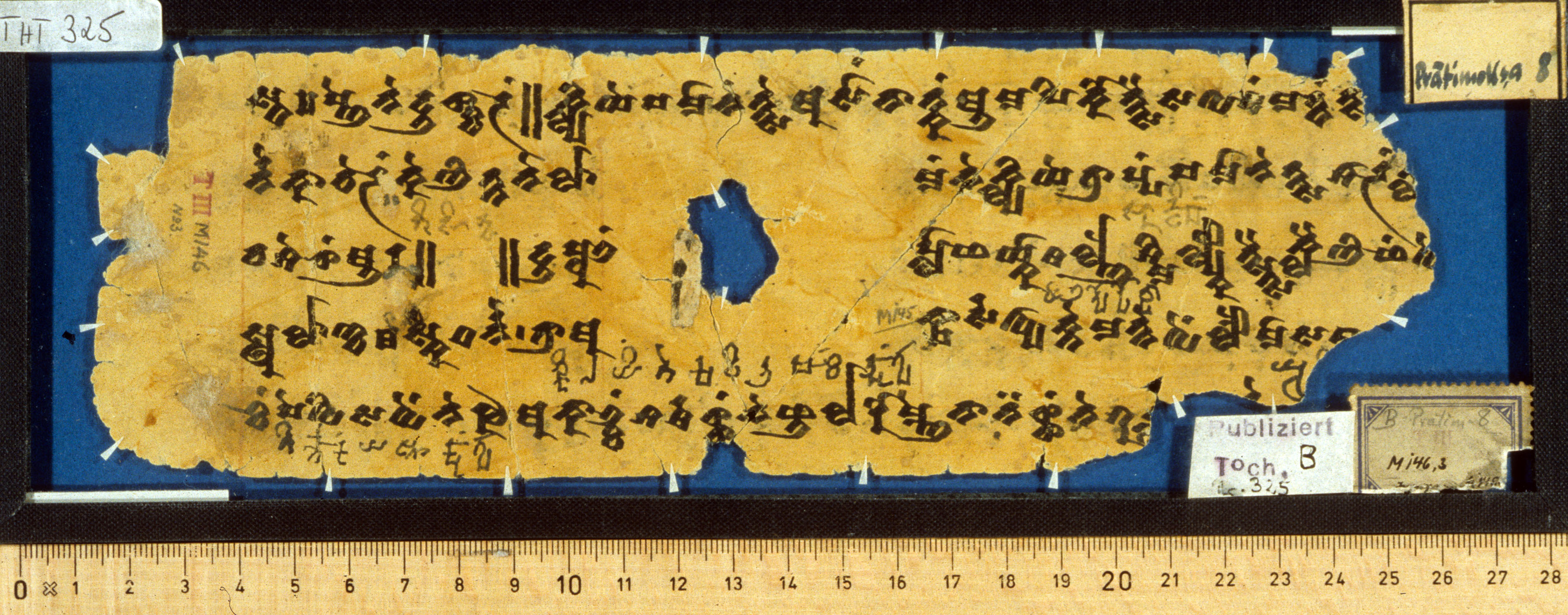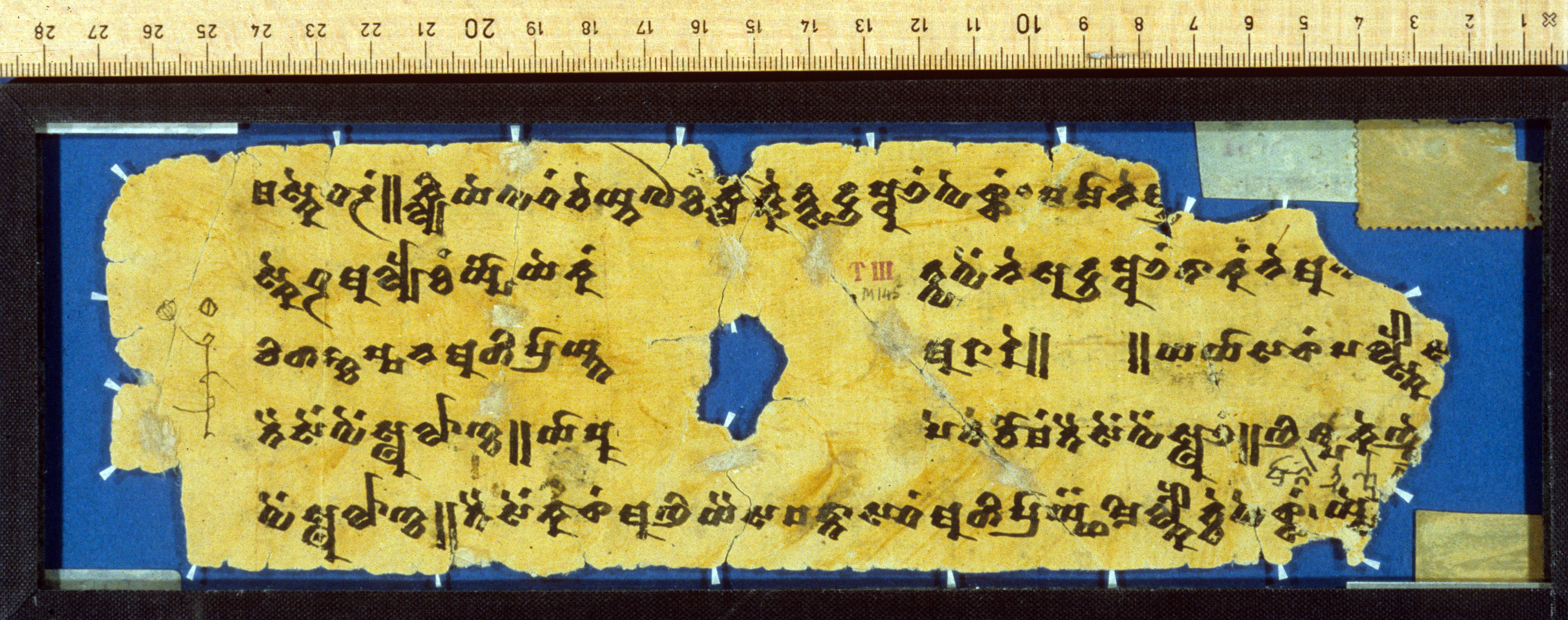THT 325
| Known as: | THT 325; B 325 |
|---|---|
| Cite this page as: | Adrian Musitz (translation). "THT 325". In A Comprehensive Edition of Tocharian Manuscripts (CEToM). Created and maintained by Melanie Malzahn, Martin Braun, Hannes A. Fellner, and Bernhard Koller. https://cetom.univie.ac.at/?m-tht325 (accessed 05 Jul. 2025). |
Edition | |
| Editor: | Adrian Musitz (translation) |
Provenience | |
| Main find spot: | Murtuk |
| Expedition code: | T III M 146.3 |
| Collection: | Berlin Turfan Collection |
Language and Script | |
| Language: | TB |
| Linguistic stage: | late |
| Script: | classical |
Text contents | |
| Title of the work: | Vinayavibhaṅga |
| Passage: | SA 2-4 |
| Text genre: | Literary |
| Text subgenre: | Vinaya |
Object | |
| Manuscript: | THT 324-332 |
| Material: | ink on paper |
| Form: | Poṭhī |
| Number of lines: | 5 |
Images
Images from idp.bl.uk by courtesy of the International Dunhuang Project, the Berlin-Brandenburgische Akademie der Wissenschaften, and the Staatsbibliothek zu Berlin – Orientabteilung.
Transliteration
| lf | 80 9 |
|---|---|
| a1 | sta ma ṣñe ne du s̝ka¯ ¯r || klyi ye ṣa mā ne ntse a sāṃ nā tkaṃ ā ma pi ko ntsai sa wa¯ ¯t ma¯ ¯nt tsā /// |
| a2 | rne kā ce¯ ¯r ke ñi nta ne lā maṃ ne klyi ye trā ppaṃ ṣa mā ne ntsa śā¯ ¯r kl· /// |
| a3 | va śe¯ ¯s̝ ā ra || || du ṣṭhu¯ ¯l plā¯ ¯ś ykā sa lñe śmi lyko tstsai klai ñi¯ ¯ś we /// |
| a4 | sthu lā ñca ma ske ta rne • trā a kṣā rsa wyā kne ma nte weṃ lau mā sa m· /// |
| a5 | ¯k ṣe wi sa weṃ ne 5 a kā¯ ¯lk śa rsa s̝s̝aṃ ne 6 la ro mñe nā nä s̝s̝aṃ ne 7 [klyi] /// |
| b1 | ma ske ta¯ ¯r || klyi ye wa¯ ¯t ce yna o¯ ¯k kl[au] tke ntsa du ṣṭhu¯ ¯l we s̝s̝aṃ • ṣa mā ne ā /// |
| b2 | ske tra a lye¯ ¯k ypo ye kaṃ twa weṃ ne su du ṣṭhu¯ ¯l tā kaṃ ne a n[ā] /// |
| b3 | vi bha ṅka ṣṣa na a bhi prā ynta a rā re || || ya yā sa¯ ¯s̝ pa lsko sa /// |
| b4 | tai seṃ weṃ sthu lā ñca || yā ṣṣu pe te co¯ ¯m tai seṃ weṃ sthu¯ ¯l || ñi śpa ke ññe /// |
| b5 | weṃ sthu lā ñca || tai seṃ ka¯ ¯s̝ a ñi yai sa pa ttā sa¯ ¯t a bhi prā¯ ¯yśä mi lkau cce we s̝s̝aṃ • yse /// |
Transcription
| lf | 80-9 |
| a1 | stämäṣñene duṣkär ॥ klyiye ṣamānentse asāṃ nātkaṃ āmapi kontsaisa wat mant tsā /// |
|---|---|
| a2 | rne kācer keñintane lāmaṃne klyiye trāppaṃ ṣamānentsa śār kl· /// |
| a3 | vaśeṣ āra ॥ ॥ duṣṭhul plāś ykāsälñeś milykotstsai klaiñiś we /// |
| a4 | sthulāñca mäsketär-ne • trā akṣārsa wyākne mante weṃ lau mā sam· /// |
| a5 | k ṣewisa weṃne 5 akālk śarsäṣṣäṃ-ne 6 laromñe nānäṣṣäṃ-ne 7 klyi /// |
| b1 | mäsketär ॥ klyiye watn1 ceyna ok klautkentsa duṣṭhul weṣṣäṃ • ṣamāne ā /// |
| b2 | sketrä alyek ypoye kaṃtwa weṃne su duṣṭhul tākaṃ-ne anā /// |
| b3 | vibhaṅkäṣṣana abhiprāynta arāre ॥ ॥ yayāsaṣ palskosa /// |
| b4 | taiseṃ weṃ sthulāñca ॥ yāṣṣu pete com taiseṃ weṃ sthul ॥ ñiś pakeññe /// |
| b5 | weṃ sthulāñca ॥ taiseṃ ka ṣ añiyaisa pättāsat abhiprāyś milkaucce weṣṣäṃ • yse /// |
Translation
| a1 | ... in setting up... a duṣkar-sin. If a woman nudges the seat for a monk with āmapior kontsaisa, so... |
|---|---|
| a2 | ... if his daughter sits on his lap, or a woman trips and falls on top of the monks... |
| a3 | ... ended... |
| a3+ | If he says a wicked word based on concupiscence to women, ... his is a grave offense. |
| a5+ | If he says wyāknewith the Akṣara trā(?), if he... far... not..., if he speaks with pretense to her 5, if he lets her know his wish 6, if he shows dearness to her 7, woman..., it is (a great offense). |
| b1 | Or/And a woman speaks wickedly in those eight ways. |
| b1+ | A monk... is... |
| b2 | If he speaks in foreign language, and if it is wicked, (no offense). |
| b3 | ... the "meaning of the Vibhaṅgas" has ended. |
| b3+ | If with excited thought... speaks thus, (it is) a grave offense. |
| b4 | If he says: "Give me those alms", (it is) a grave (offense). |
| b4+ | If he says: "I... part...", it is a grave offense. |
| b5 | He speaks concerning (his?) intention: "Put ... through añiyaithus..." |
Other
| a2 | … if a daughter sits down on his knees, or a woman stumbles and falls (?) over the monk, … (Peyrot 2013b: 697) |
|---|---|
| a5 | … If he speaks to her with another pretext. 5236 If he lets her know his wish. 6 If he manifests his love to her. 7 (Peyrot 2013b: 698) |
| b2 | If he speaks in the language of another country, and this contains [lit. has] offensive speech—no offence. (Peyrot 2013b: 698) |
| b4 | «Give me alms!» If he speaks thus, it is a sthūla offence. (Peyrot 2013b: 698) |
Commentary
Linguistic commentary
| n1 | watseems to be closer to "and" than "or". The text preceding this explains the ways in which men speak duṣṭhul-ly. Now it discusses the ways in which women speak duṣṭhul-ly. |
|---|
Alternative linguistic/paleographic classifications
| Peyrot 2008 | L |
| Tamai 2011 | C1 |
| Tamai 2011 | C14 |
References
Online access
Edition
Sieg and Siegling 1953: 209-210
Translations
Carling 2000: a2 (215, 340); Couvreur 1954c: a1 a2 a3 a4 a5 b1 b2 b3 b4 b5 (114); Ogihara 2009: a1 a2 a3 a4 a5 b1 b2 b3 b4 b5 (288-289); Peyrot 2013b: a2 (697), a5 (698), b2 (698), b4 (698), b5 (698); Schmidt 1974: a5 (274 n.3); Thomas 1957: a3 (211), b3 (211)
Bibliography
Carling, Gerd. 2000. Die Funktion der lokalen Kasus im Tocharischen. Berlin/New York: de Gruyter.
Couvreur, Walter. 1954c. “Koetsjische literaire fragmenten uit de Berlijnse verzameling (naar aanleiding van Sieg & Siegling’s Tocharische Sprachreste).” Handelingen VIII der Zuidnederlandse Maatschappij voor Taal- en Letterkunde en Geschiedenis, 97–117.
“The International Dunhuang Project: The Silk Road Online.” n.d. http://idp.bl.uk.
Ogihara, Hirotoshi. 2009. “Researches about Vinaya-texts in Tocharian A and B [Recherches sur le Vinaya en tokharien A et B].” PhD, Paris: École Pratique des Hautes Études.
Peyrot, Michaël. 2008. Variation and change in Tocharian B. Vol. 15. Leiden Studies in Indo-European. Amsterdam/New York: Rodopi.
Peyrot, Michaël. 2013b. The Tocharian subjunctive. A study in syntax and verbal stem formation. Vol. 8. Brill’s Studies in Indo-European Languages & Linguistics. Leiden/Boston: Brill.
Schmidt, Klaus T. 1974. “Die Gebrauchsweisen des Mediums im Tocharischen.” PhD, Universität Göttingen.
Sieg, Emil, and Wilhelm Siegling. 1953. Tocharische Sprachreste. Sprache B, Heft 2. Fragmente Nr. 71-633. Edited by Werner Thomas. Göttingen: Vandenhoeck & Ruprecht.
Tamai, Tatsushi. 2011. Paläographische Untersuchungen zum B-Tocharischen. Innsbrucker Beiträge zur Sprachwissenschaft 138. Innsbruck: Institut für Sprachen und Literaturen.
Thomas, Werner. 1957. Der Gebrauch der Vergangenheitstempora im Tocharischen. Wiesbaden: Harrassowitz.
Gippert, Jost, Katharina Kupfer, Christiane Schaefer, and Tatsushi Tamai. n.d. “Thesaurus Indogermanischer Text- und Sprachmaterialien (TITUS): Tocharian Manuscripts from the Berlin Turfan Collection.” http://titus.fkidg1.uni-frankfurt.de/texte/tocharic/thtframe.htm.




